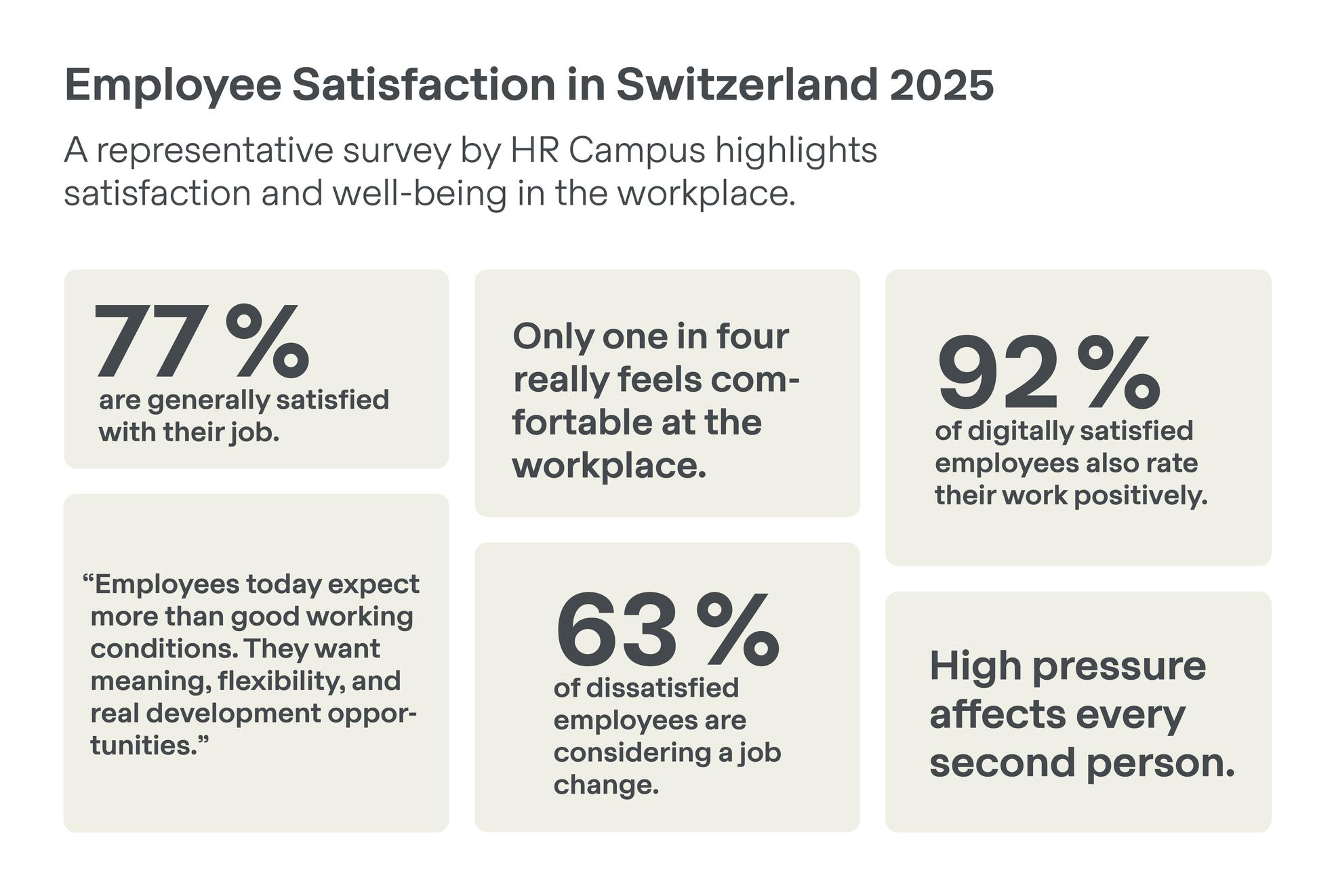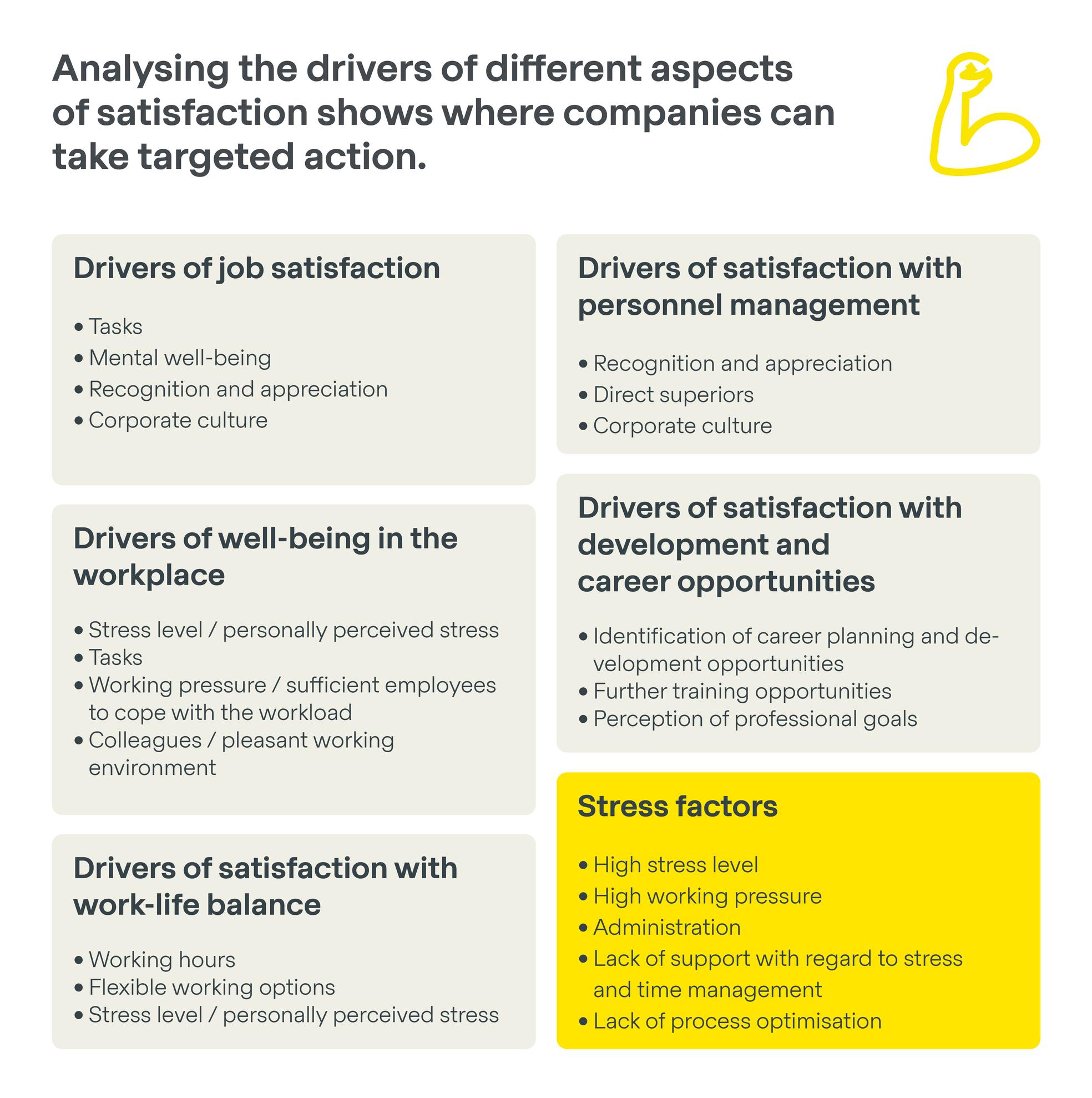Many people are satisfied, but only just under one in three are perfectly happy at work. The representative study on employee satisfaction in Switzerland shows why internal communication can become a brake on satisfaction and how HR can create real commitment.
Open and trusting internal communication is increasingly becoming a relevant lever for employee satisfaction. After all, those who feel understood and appreciated stay. The latest Study on employee satisfaction in Switzerland from HR Campus provides insightful findings in this regard. It shows which factors actually influence satisfaction and commitment and how closely communication, leadership, digitalisation and development opportunities are interwoven (see Figure 1). The interview with our strategy consultant Sandra Lugonjic is therefore not just about figures, but also about tangible ideas for everyday HR work.

Sandra, the study shows that employee surveys and feedback meetings are carried out regularly. Nevertheless, these often remain ineffective. How can it be that companies are failing in their efforts to communicate openly?
More than half of those surveyed stated that their employers conduct an employee satisfaction survey at least once a year. In addition, more than three quarters of all respondents state that they hold personal feedback meetings with line managers or HR managers at least once a year. At the same time, we see that aspects such as leadership, development opportunities or career opportunities are rated significantly lower than structural framework conditions such as working hours, cooperation with colleagues or flexibility.
There is obviously a gap here between communication and the actions actually taken, as no tangible next steps are defined or implemented after the discussions or surveys. In practice, we still see too often that discussions between employees and managers only take place "pro forma" or that communication is perceived as "top-down" instead of a participatory dialogue.
In order for such processes to be effective, it is advisable to involve employees in the design of these processes, to communicate the results and follow-up actions transparently and to make them accessible to everyone using digital tools. The active involvement of employees can lead to appreciation and communication on equal footing, which also increases satisfaction.
This open access to information is perceived as one of the greatest strengths of HR management. At the same time, it is clear that a lack of transparency in companies is a confidence killer. How can companies overcome the hurdles of transparency to increase trust?
People who have a high level of trust in their management are measurably more satisfied in their jobs. This also shows that trust is created in particular through perceived closeness: While 64 per cent of respondents show a high level of trust in their direct superiors, only 45 and 42 per cent of respondents respectively have a high level of trust in company management and HR. In addition to organisational and human proximity, digitalisation offers an additional positive lever here. For example, respondents stated that having access to their own data promotes trust in their company. Modern intranet solutions or collaboration tools can also help to make information and decisions accessible and understandable.
When it comes to HR in particular, there is still room for improvement in terms of trust and transparency. The study shows: HR can also benefit from greater trust through clear and standardised salary structures, transparency in HR processes, faster communication or access to their own personal files. For this to succeed, however, clear guidelines for HR processes are required - and management that shares information openly and transparently.

Sandra Lugonjic
Strategy consultant at HR Campus
In addition to access to information and digitalisation, satisfaction is also strongly linked to appreciation and development prospects. How can companies make targeted investments in these drivers, even without a large budget?
In the study, we see that less than 40 per cent of respondents are satisfied with the development and career opportunities in their company. The consequences are clear: those who do not feel heard and appreciated will seek growth elsewhere. These aspects are measurable drivers of motivation and loyalty.
As previously mentioned, regular dialogue alone does not create added value. What is needed is active and modern talent management instead of mere personnel administration - and the inclusion of employees' needs in such processes.
Even a shift from retrospective and formal feedback discussions that are never followed up on to forward-looking dialogues with actionable measures can bring improvement. Before investing in comprehensive talent management solutions, it is also possible to begin with simple and effective means. Appreciation costs nothing. Regular, honest feedback, involvement in decisions, and praise on a day-to-day basis often have a greater impact than other incentives.
In conclusion: What is the most important recommendation to HR managers who want to work with the results of this study?
In addition to the aspects mentioned here, the study offers further insights into relevant areas of action for employee satisfaction (see also Figure 2). It is crucial that each company chooses an approach that truly works for the individual group of employees. To begin with, small, targeted changes are sufficient to better meet the needs of employees. This is provided that there is open and honest dialogue in both directions. A requirement that should not be underestimated!
A higher degree of digitalisation can also significantly support many aspects of employee satisfaction and contribute to a better sense of well-being and a lower perceived stress level. The study clearly shows this: Satisfied employees are more resilient and have a stronger sense of commitment to their employer.

Interview with:

Sandra Lugonjic
Consulting Strategies
As a strategy consultant at HR Campus, Sandra Lugonjic supports HR organisations in improving their Employee Experience through targeted measures and becoming more efficient.
HR Knowledge
In our download portal you will find useful fact sheets, helpful checklists and supporting information for you and your HR team to download.

